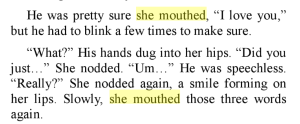To jaw-jaw is always better than to war-war.
— Winston Churchill, at the White House in 1954. Source: http://www.bartleby.com/73/1914.html
I’ve always been more into depth than breadth. It’s more like me to explore every restaurant on a single street than to try to cover the top ten eateries of a city; to try everything on the menu of one restaurant, going back week after week, than to go from restaurant to restaurant; to spend years with one woman, rather than flitting from flower to flower, as the girls say in the Philippines. (This hasn’t stopped me from being married three times, or perhaps that’s why I’ve been married three times.)
Want to know more about denominal verbs? See this blog post, and Carolyn Gottfurcht’s fascinating doctoral dissertation on the subject of the kinds of relationships that can exist between the original noun and the derived verb.
So, when learning vocabulary, I like to pick one subject, and dive deep. Lately I’ve been struck by my crappy command of words for common things–in particular, parts of the face. In the way that things always seem to spin out of control, or to become more complicated, or to just be connected to everything else, that soon branches out into questions of pronunciation, questions of how words are put together, and who knows where else I’ll end up–which is to say, what I’ll be distracted by–but, let’s be polite–by the time I finish writing this. For today, let’s talk about English verbs that come from parts of the face. We recently talked about the phenomenon of denominal verbs–that is, verbs that are made from what were originally nouns. English has a bunch of these verbs that are related to body parts. We’ll focus today on denominal verbs that come from parts of the mouth. They tend to be related to three ideas: producing language, chewing, and making contact with a physical object. As we go along, we’ll see others, too.
English notes

to lip: to speak in a disrespectful way to someone, perhaps especially if answering something said to you by an authority figure. You can’t lip just anyone–it has to be someone to whom you’re supposed to show respect.

to jaw: to talk, particularly at length and about nothing very important.

to mouth (first definition): From Google: say (something dull or unoriginal), especially in a pompous or affected way. From The Free Dictionary: To utter without conviction or understanding; To declare in a pompous manner; declaim.

to mouth (second definition): to say or sing without making a sound. From The Free Dictionary: To form soundlessly.

to mouth off to someone: to speak disrespectfully to someone. Again, this needs to be someone in a position of authority, someone to whom you owe respect.
Native speakers of French: are there French verbs that come from the nouns referring to parts of the mouth, whether they denote acts of speaking, or anything else? I’d love to hear about them.


I love this! Mouthing off is my speciality when in a particular frame of mind, jawing is my speciality but I try not to give too much lip these days. By the way I am thrice married too …. perhaps we should start a club 😉
LikeLiked by 1 person
Hmmmm… Might be one of those “I don’t want to belong to any club that would have me” things. 🙂
LikeLiked by 2 people
Pretty much 😉
LikeLiked by 1 person
French doesn’t seem to like associating parts of the mouth with actions . At most is there the grand classic “gueuler” from la gueule, the mouth in coarse slang and “gargouiller”, from an old form of”la gorge”: “la gargante” -cf Rabelais’character, Gargantua .
LikeLiked by 1 person
Thank you!
LikeLike
My partner always laughs at me for miss pronunciation 😊
LikeLiked by 1 person